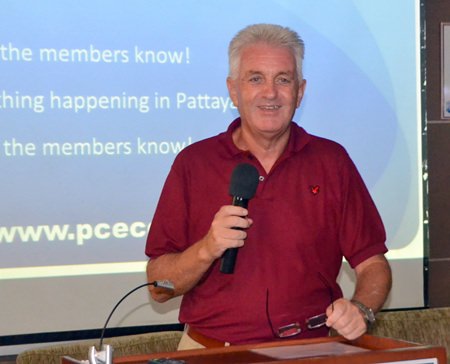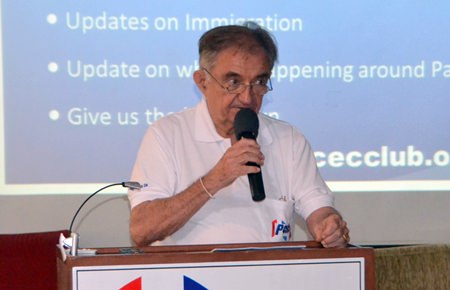Re-boot your mind to learn Thai. This was the message from Stuart Jay Raj, the guest speaker at the December 27 meeting of the Pattaya City Expats Club. He began by asking the audience to imagine a sparkling white shirt, just out of the package. Now imagine dragging it through the mud, maybe add a grass stain or two. Is the shirt still the same? Is it possible to return it to its original pristine state? Maybe you could come close with some rigorous cleaning, but it would never be back to its exact original state.
 Prior to introducing the guest speaker, MC Roy Albiston welcomes members and guests to the weekly Sunday meeting of the PCEC and hopes everyone enjoyed a Merry Christmas and wishes all a Happy New Year.
Prior to introducing the guest speaker, MC Roy Albiston welcomes members and guests to the weekly Sunday meeting of the PCEC and hopes everyone enjoyed a Merry Christmas and wishes all a Happy New Year.
According to Stuart, when you try to learn a new language such as Thai, your native language works like that stain, filtering the new language through your native language. As a result, the tendency is to try to translate the Thai, word for word, into your native language. Instead, you need to “reboot your mind” so that you start thinking in Thai rather than filtering it through your native language.
Stuart, who is part Australian and part Indian, says his Australian grandfather spoke 13 languages and taught him not only about languages, but also systems for communication. His talents have allowed him to earn a professional living as a simultaneous interpreter in Thai, Mandarin, Cantonese, and Indonesian, among others, as well as providing language and cultural training for multinational companies in the region and hosting his own TV program on Thailand’s Channel 5. He holds a degree in Cognitive and Applied Linguistics from Griffith University and has become an expert in the field of language acquisition with a strong track record of success. Stuart’s background knowledge of Sanskrit, Khmer, Thai, Lao and various Chinese and Indian languages, dialects and minority languages enables him to present a fascinating and unique perspective on the languages, cultures and business across the region which makes everything fall logically into place.
Throughout his talk, Stuart effortlessly slipped into various languages and dialects, one right after the other, making the presentation both interesting and entertaining. He has developed a suite of hand and body signs, glyphs, colourful stories and exercises that will help learners of Thai lay down a new linguistic and cultural operating system for their mind and body.
 Stuart Jay Raj explains his linguistic background and says no one is too old to learn Thai by understanding not only the language, but also speech patterns. You need to “reboot your mind” so that you start thinking in Thai rather than filtering it through your native language.
Stuart Jay Raj explains his linguistic background and says no one is too old to learn Thai by understanding not only the language, but also speech patterns. You need to “reboot your mind” so that you start thinking in Thai rather than filtering it through your native language.
He says learning a new language includes preparing not only your mind, but also your body and your environment. You need to tune into your powers of observation and change your way of thinking. Each language has its own natural rhythm; for example, what he calls the “Listing English paradigm: when we say a list of items, every item in the list has a rising tone except the last one, which has a falling tone. But in Thai, every word has a specific tone, regardless of where it appears in a sentence or list.
Stuart asked the audience to repeat the sentence “Why did you say he didn’t want it anymore?” several times, until the natural rhythm of English became very apparent. Then he said the sentence the way a native Thai speaker would likely say it, and displayed a sound print showing the very different sound pattern of the native English speaker vs. the native Thai speaker. He explained that English flows, but Thai, like many other languages, has a glottal stop after almost every syllable. The throat closes up and kills the sound; no “s” or “sh” or “t” for example, can escape at the end of a syllable.
 Stuart Jay Raj comments on the Thai word “sawasdee” typically used by Thais in greeting, its origins, and meaning along with an explanation of the Thai “wai” that goes with the spoken greeting.
Stuart Jay Raj comments on the Thai word “sawasdee” typically used by Thais in greeting, its origins, and meaning along with an explanation of the Thai “wai” that goes with the spoken greeting.
As an example of his learning technique, he asked the audience to stand and say the Thai word “kyyn” – which means “rising” or “increasing.” Although the word is pronounced in a falling tone, he asked the audience to raise their arms while saying it. Then, while lowering their arms, he asked everyone to say “long” – the Thai word for “falling” or “decreasing.”
Next he asked everyone to push one of their arms away while saying “bpai” – or “go” in Thai, then bring the arm back toward themselves while saying “maa” — you guessed it, “come” in Thai. And finally, “nai” (rising tone) with palms up and shrugging shoulders in a questioning gesture. Now, put the Thai words “bpai nai maa” together, and if you ignore the English language in your mind, the meaning is very logical: “Where did you go” or “where have you gone?” Simple, huh?
 Stuart Jay Raj notes that learning to write Thai script is important in learning to speak and understand the spoken language, but he believes the typical alphabet chart used for teaching would make it easier to learn if it was changed to show the script in a more logical sequence.
Stuart Jay Raj notes that learning to write Thai script is important in learning to speak and understand the spoken language, but he believes the typical alphabet chart used for teaching would make it easier to learn if it was changed to show the script in a more logical sequence.
“The wonderful thing about the Thai language is that it’s based on a beautiful, logical system,” Stuart says. “I’ve yet to receive a question that can’t be explained away in a logical and easy to understand manner.”
In order to learn more about Stuart’s method of learning Thai by “rebooting” your mind, go to http://stujay. com/2015/09/07/introducing-cracking-thai-fundamentals-ctf-the-book/. Stuart spent 16 years developing his book, “Cracking Thai Fundamentals,” which explains the process of how to re-boot your mind as you are never too old to learn Thai. His book is available for purchase from his website.
 MC Roy Albiston presents Stuart Jay Raj with the PCEC’s Certificate of Appreciation for his excellent presentation on how to approach learning Thai by thinking in the Thai language rather than your native language.
MC Roy Albiston presents Stuart Jay Raj with the PCEC’s Certificate of Appreciation for his excellent presentation on how to approach learning Thai by thinking in the Thai language rather than your native language.
At the conclusion of the Program, MC Roy Albiston brought everyone up to date on Club and other events and called on Roger Fox to conduct the Open Forum, where questions are asked and answered about Expat living in Thailand, especially Pattaya.
For more information on the PCEC’s many activities, visit their website at www.pcecclub.org.
 Member Pat Koester announces an upcoming trip she is organizing to the River Kwai in February and invites PCEC members and guests to join her on this two night trip which will include several sights of interest in the area.
Member Pat Koester announces an upcoming trip she is organizing to the River Kwai in February and invites PCEC members and guests to join her on this two night trip which will include several sights of interest in the area.




